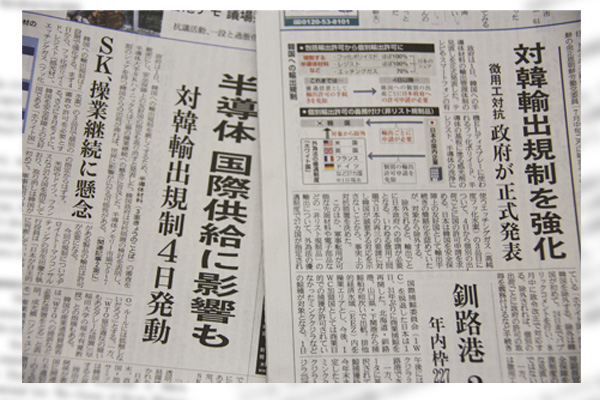Why are Japanese media reports distorted when it comes to South Korea? Some media reports have described Japan’s tightened control on semiconductor material exports to South Korea as “an effective trade embargo” and criticized the measure as possibly running counter to World Trade Organization rules. These reports represent misinterpretation from the lack of understanding about the export control regime.
The latest measure has also been viewed by some as an effective counter to South Korea’s treatment of wartime Korean workers in Japan because of growing calls for such a counter in Japan. As a result, media reports about the Japanese measure have been distorted, leading South Korea for its part to overreact.
Not a response to the wartime worker problem
Developed countries have implemented strict export controls within an international framework to prevent dual-use goods from flowing into countries of concern. The Japanese measure in question is designed to meet Japan’s international obligations for such export controls, differing essentially from any sanction based on selfish logics of some big powers.
The Japanese measure represents an operational change rather than any new regulation, switching from an exceptional blanket export approval to a usual case-by-case approval on each export deal.
Why has Japan made such operational change? South Korea has criticized the measure as designed for political purposes. However, the reason for the Japanese measure is an export control problem. The wartime Korean worker problem is nothing more than a background. Any background must not be confused with any reason.
The exceptional blanket approval represents a preferential treatment of the so-called white countries with which Japan has close consultations on export controls. Given that South Korea has not accepted such consultations for the past three years, it is natural for Japan to drop South Korea from the list of white countries.
As a result, South Korea is treated in the same way as other Asian countries. For comparison, the European Union has given a preferential treatment regarding export controls to eight countries that include Japan but exclude South Korea.
South Korea has also been involved in inadequate export control cases. Its sloppy management of transactions has been frequent. Japan, if leaving such South Korean practice to lead to sensitive goods’ flow into third countries of concern, would be internationally held responsible in regard to export controls.
These cases represent an enough reason to justify the Japanese measure. South Korea cites the background wartime worker problem for criticizing the Japanese measure as designed for political purposes. Even without the wartime worker problem, however, the Japanese measures would have been taken. Even if the wartime worker problem were resolved, the Japanese measure would not be withdrawn.
Not running counter to WTO rules
South Korea has brought the Japanese measure to the WTO. However, export controls for national security reasons are implemented by countries based on international agreement, amounting to a national security exception to WTO rules. If the latest Japanese measure is interpreted as violating WTO rules, all export controls in other countries may be so.
Some media reports claim that the Japanese measure would be a serious blow to South Korea’s semiconductor production, shaking a global supply chain. However, the Japanese measure is not an export ban. Although case-by-case approvals may take more time than a blanket approval, ordinary deals will be approved. No serious effect can be expected on trade. In fact, exports to other Asian countries subject to case-by-case approvals have remained free from problems. Media reports attributable to the lack of understanding about export control regime add fuel to fears in the business community and encourage South Korea to criticize the Japanese measure.
Given that correct information has failed to be sent, Japan must explain to the international community that it has done what it should do regarding export controls.
Masahiko Hosokawa is a special professor at Chubu University and a former director-general of the Trade Control Department at Japan’s Ministry of Economy, Trade and Industry.


